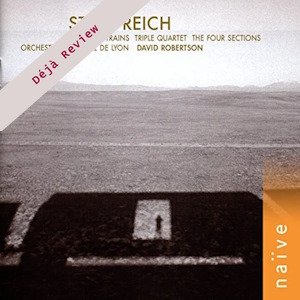
Déjà Review: this review was first published in February 2005 and the recording is still available.
Steve Reich (b. 1936)
Different Trains (2000)
Triple Quartet (1999)
The Four Sections (1986)
Orchestre National de Lyon/David Robertson
rec. 2003, Lyon, France
Naïve MO782167 [65]
It is indeed rare, extremely rare, when a piece of music strikes me in such a way as to stop me in my tracks and absolutely demand my undivided attention until its completion. Such a work is Steve Reich’s Different Trains, originally composed for the Kronos Quartet in 1988, here presented in its orchestrated version from 2000. Scored for string orchestra with an accompanying pre-recorded tape, this is a work that through its very sounds evokes a time gone by, and conjures both memories (for those alive then) and vivid images (for those who were not) of an era in which the locomotive was the dominant mode of transport, for both good and evil.
Reich is one of the big three so-called ‘minimalist’ American composers. He quickly makes you forget that he is using a ‘technique’ per se, and conjures a sound-world that is both musically stimulating and, through the masterful use of snippets of recorded voices, a realm that is incredibly visual. That Reich composed his music around the pitches of the natural rise and fall of the speakers’ inflections could, in the wrong hands be trite. Here it is a stroke of absolute genius. Divided into three sections, there are three periods and places portrayed: America before WWII, Europe during the war, and America again just after the Allied victory. From the first intonation of “From Chicago to New York,” the listener is catapulted back in time to the black and white newsreel world of our parents and grandparents.
Although I would never wish for music composed in the United States to remain the sole province of American orchestras, I cannot help but sense some crazy lack of equilibrium as fine recording after fine recording of American music continues to appear from foreign orchestras. In this case, the Orchestre National de Lyon is on deck, albeit led by an American conductor, and they perform this music to near perfection. They are rhythmically taut, flawless in intonation and they capture the spirit of this music by playing it as if it were second nature, and not the work of a composer famous for a specific set of techniques.
Two other fairly major works round out the program, though I must confess that despite their high quality, they do not impress nearly as profoundly as Different Trains. The Triple Quartet for string orchestra is a rather hypnotic piece. Far more interesting is The Four Sections – a work that begins softly and gently, dominated by the string section with occasional incursions from the winds. In the second movement it takes on a great deal more rhythmic vitality with the addition of two pianos and a large complement of percussion. It returns to a more sedate ending in the third movement.
David Robertson, music director designate of the St. Louis Symphony Orchestra and until recently music director of the Lyon group leads spellbinding performances. If you are interested in a painless introduction to some more modernist music, then this is a place to start. Regardless of your tastes, Different Trains, like John Adams’ Harmonielehre and Philip Glass’s Music in Twelve Parts is a must-have for any serious music lover.
A complete winner, this. Highly recommended.
Kevin Sutton
Help us financially by purchasing from



















